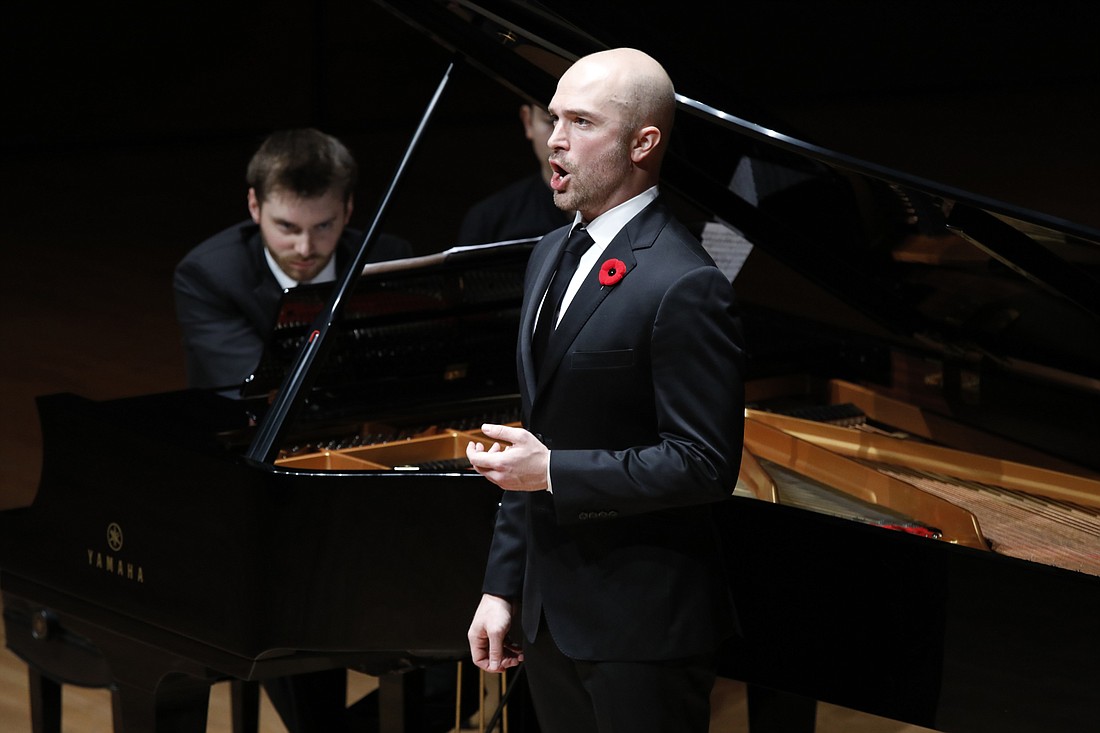- April 18, 2024
-
-
Loading

Loading

Music has the unparalleled power to draw listeners into a specific moment, feeling or other experience — and that’s the goal of Artist Series Concerts of Sarasota’s latest concert.
“Armistice: The Journey Home” honors the 100th anniversary of the signing of the armistice that ended World War I. The traveling show debuted at the Lincoln Center’s Alice Tully Hall earlier this year to critical acclaim, and now the duo behind it — pianist Peter Dugan and baritone John Brancy — are bringing it to Sarasota shortly before Veterans Day.
“The program is designed to commemorate that time period but also to talk about the soldier’s journey home and talk about what happens after war,” Brancy says.
Dugan says the show is unique in that the works being performed were written by several poets and composers who fought — some of whom were killed — during WWI. The challenges of war and timeless theme of wandering are the focus of many of these pieces.
Wandering looks a little different but remains a relevant theme today, Dugan adds, referencing the migrants and refugees around the world who leave their homes to seek safety and/or a better life.
“That’s sort of what makes this program special for us,” the pianist says. “Even though it’s primarily focused on a point 100 years ago, we think no matter who you are or what your story is, it’ll resonate with you.”
The program uses the music of Holst, Schubert, Rachmaninoff, Irving Berlin, Pete Seeger and other composers to tell the story of men and women who must find their way home from the devastation of war, and they took extra care in their song-selection process to ensure each piece would make a significant impact.
“We’re hoping that the truth of these songs comes through in a very visceral way because it’s art that was in some cases created at the front or at the time of war — it gives off real truth about the war,” Dugan says.
He adds that patriotic songs were quite cheesy at the end of WWI in 1918 because they had a naive, overly optimistic perspective of what the end of that war would mean. It wasn’t the “war to end all wars,” as it was often called, because 100 years later wars are still occurring in, or somehow affecting, nearly every corner of the globe.
When performing patriotic songs from that time, Dugan says it’s vital the duo remains aware of the ironies that result from the composers’ naiveté. This awareness colors the way they perform and how they connect with every new audience they meet.
Brancy agrees, adding that the preparation process for a concert like this requires them to know their subject matter deeply in order to do justice to the soldiers who were experiencing the trauma expressed in this music.
“It’s important to recognize that you’re bringing out these themes, you’re not just singing words, not just singing lines, there’s a much deeper meaning to what you’re saying,” Brancy says. “Every time we perform it we get to perform for new people across the country and in a way that teaches us something because we learn (for example) that this group of young people respond differently than veterans from wars past.”
Brancy calls the extensive research the pair put into this project a labor of love because for the past four years, they’ve dedicated their lives to understanding and performing music from mostly 20th century composers — both well-known artists and those whose work never gained much popularity.
Two songs on the program, for example, are by German composer Rudi Stephan, who was killed in WWI. These songs are rarely performed, Dugan says, and that offers an opportunity most musicians don’t get to experience.
“There’s something special about performing a piece that you know is virtually unknown,” Dugan says. “This might be the only time our audience hears a piece by Rudi live, so we have to do justice to that work. They’re also a sense of artistic freedom because we don’t have a bunch of baritones invading our head, we can really start fresh and totally jump into it with our own voice … that’s been particularly rewarding for us.”
As for what they hope audiences get out of the experience, it all goes back to sharing this renewed interest in history that was a big part of the pair’s experience. But Brancy adds they also want audience members to feel this music’s power to recognize we have a long way to go before creating a world without war.
“Classical music has a way of communicating beyond the grave,” Brancy says. “Art song is a living artifact where you get to feel what it felt like for that composer to write that piece — potentially in a trench.”
Dugan hopes the audience experiences an emotional arc-like journey throughout the evening.
“We want to share these individual stories but also in the way we experience a play or opera in that there’s a narrative and an emotional underline which makes this program quite a bit different than your typical art song recital,” he says.